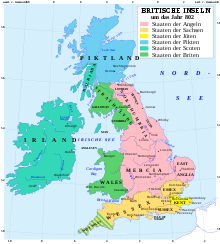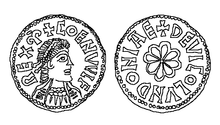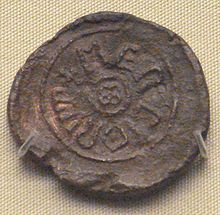Coenwulf of Mercia
Cenwulf (also Coenwulf or Kenwulph) († 821) was king of the Anglo-Saxon kingdom of Mercia from 796 until his death in 821.
Cenwulf was elevated to king of Mercia in December 796 after the death of his predecessor Ecgfrith, who had reigned for only a few months. He was descended from a distant line of Mercian royalty.
During the first two years of his reign, Cenwulf had to suppress a rebellion of the Mercia-subordinate kingdom of Kent under its king Eadberht III Præn. This rebellion had broken out shortly before Offa's death. After the suppression of the rebellion, Cenwulf appointed his brother Cuthred king of Kent. It was not until the latter's death in 807 that Kent could again be incorporated as a province of Mercia.
East Anglia seems to have broken away from Mercia after the death of Offa on the side of Kent, as coins were minted there with the effigy of the rebellious King Eadberht III. With the end of the rebellion in Kent, East Anglia came back under Mercia's direct control.
The dependent status of the kingdom of Wessex, which had been sealed by the marriage of the West Saxon king Beorhtric to a daughter of Offa, ended with Beorhtric's death in 802. He was succeeded by Egbert, who had once been driven into exile by Offa and Beorhtric. Egbert's accession marked a break in the relations between the two kingdoms, as Wessex was able to break away from Cenwulf's sphere of influence.
Mercia's influence in the kingdom of Northumbria was ended as early as 796 with the murder of King Aethelred I, who was married to Aelfflaed, a daughter of Offa. In 801 there was an invasion of Mercia by Northumbria under King Eardwulf, after Cenwulf had received Northumbrian exiles into his court. However, through the mediation of English bishops, a peace agreement acceptable to both sides was quickly reached.
The kings of the kingdom of Essex were able to maintain a degree of independence until 811. After that, they and their territory were fully integrated into Mercia.
Cenwulf's rule or suzerainty was recognised in the former or now subject kingdoms of Sussex, Essex, East Anglia as well as Kent. Although he exercised immediate dominion over the old West Saxon territories on the middle Thames which Offa had once conquered, the West Saxon court escaped his control, which meant that Cenwulf was not the suzerain of all the English kingdoms south of the Humber, and in none of his documents known to us does he refer to himself as such.
During Cenwulf's reign Mercia, after a period of stalemate under Offa, resumed its expansion westwards. Between 816 and 818 Mercian forces penetrated deep into the territories of the Welsh kingdoms of Powys and Gwynedd to the north and the kingdom of Dyfed to the south. This expansion was to continue in 821, but was not lived to see by Cenwulf himself.
In 803 the archbishopric of Lichfield, established under Offa in 786, was dissolved without significant opposition by Cenwulf, as it seemed that the control Cenwulf exercised over Kent, and thus over the archbishop of Canterbury, had made a third archbishopric in England superfluous. However, as his reign progressed, serious tensions and discord arose with Archbishop Wulfred over the Archbishop of Canterbury's claim to power, which was influenced by Frankish models. Cenwulf, like Offa before him, regarded himself as the legitimate heir to the throne of Kent and derived from this a right of disposal over monasteries and other ecclesiastical institutions, which met with fierce opposition from the Archbishop of Canterbury. The conflict culminated in Cenwulf having Archbishop Wulfred excommunicated, but without ultimately being able to subdue the episcopate.
Cenwulf died in 821.

Britain ca. 802

Depiction of Cenwulf on an early 9th century mancus.

Lead seal Cenwulfs
Questions and Answers
Q: Who was Coenwulf?
A: Coenwulf was a Mercian nobleman and King of Mercia from 796 until his death in 821.
Q: Did Coenwulf have a claim to the throne?
A: Yes, Coenwulf claimed to be a descendant of Cenwalh, a brother of Penda and Eowa.
Q: Was King Ecgfrith's death suspicious?
A: Yes, King Ecgfrith's death was suspicious.
Q: Did Coenwulf benefit from King Ecgfrith's death?
A: Yes, Coenwulf certainly benefited from King Ecgfrith's death.
Q: Was Coenwulf ever formally accused of King Ecgfrith's death?
A: No, Coenwulf was never formally accused of King Ecgfrith's death.
Q: Was Coenwulf a strong king?
A: Yes, Coenwulf proved to be a strong king who quickly restored Mercian dominance in southern England.
Q: Was Coenwulf the last of the Mercian overlords?
A: Yes, Coenwulf was the last of the Mercian overlords or bretwaldas.
Search within the encyclopedia